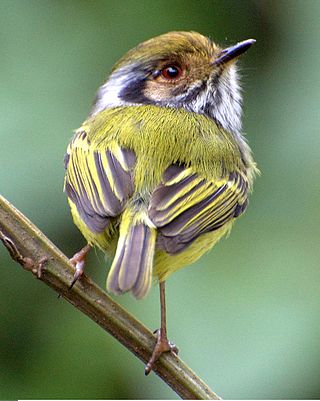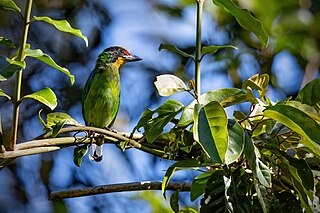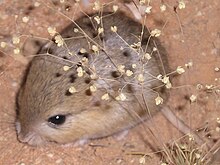
The outer ear, external ear, or auris externa is the external part of the ear, which consists of the auricle and the ear canal. It gathers sound energy and focuses it on the eardrum.

Gerbillinae is one of the subfamilies of the rodent family Muridae and includes the gerbils, jirds, and sand rats. Once known as desert rats, the subfamily includes about 110 species of African, Indian, and Asian rodents, including sand rats and jirds, all of which are adapted to arid habitats. Most are primarily active during the day, making them diurnal, and almost all are omnivorous.

Newell's shearwater or Hawaiian shearwater (ʻaʻo), is a seabird in the family Procellariidae. It belongs to a confusing group of shearwaters which are difficult to identify and whose classification is controversial. It was formerly treated as a subspecies of the Manx shearwater and is now often placed in Townsend's shearwater. It is endemic to the Hawaiian Islands.

Massonia is a genus of bulbous perennial flowering plants in the family Asparagaceae, subfamily Scilloideae. It is native to southern Africa, and is found in localities such as Namaqualand with hot and dry summers, being dormant in summer and growing during winter. The genus Whiteheadia has been merged into Massonia. It is classed as a cryptophyte.

Acanthosicyos horridus is an unusual melon that is endemic to the Namib desert. In English it is known as Nara, butter-nuts, or butterpips; in one of the Khoisan languages it is locally called ǃnaras or ǃnara.

The golden-throated barbet is an Asian barbet native to Southeast Asia, where it inhabits foremost forests between 900 and 2,700 m altitude. It is listed as Least Concern on the IUCN Red List because of its wide distribution and stable population.

Thomasomys is a genus of rodents in the family Cricetidae, named after British zoologist Oldfield Thomas. Nuclear DNA sequence analysis has indicated that it is a sister taxon to Rhagomys. It contains the following species:

The painted parakeet, known as the painted conure in aviculture, is a species of bird in subfamily Arinae of the family Psittacidae, the African and New World parrots. It is found in Brazil, Colombia, French Guiana, Guyana, Panama, Suriname, and Venezuela.

The ochre-throated foliage-gleaner is a species of bird in the Furnariinae subfamily of the ovenbird family Furnariidae. It is found in Panama and every mainland South American country except Argentina, Chile, Paraguay, and Uruguay.

The white-eared sibia is a bird in the laughingthrush family Leiothrichidae. The species is sometimes placed in the monotypic genus Malacias. It was first described by Robert Swinhoe in 1864. There are no subspecies.

The masked antpitta is a Vulnerable species of bird in the family Grallariidae. It is endemic to Bolivia.

The spotted antpitta is a species of bird in the family Grallariidae. It is found in Brazil, Colombia, French Guiana, Guyana, Peru, Suriname, and Venezuela.

The eared pygmy tyrant is a species of bird in the family Tyrannidae. It is found in Brazil, Paraguay and northeastern Argentina. Its natural habitats are subtropical or tropical moist lowland forest and heavily degraded former forest. The birds are usually found in humid forest and at edges, from sea level to 1200 m, and looking for food in lower growth or the midstory. Their main source of food is insects and their nests are usually found quite low above the ground, shaped like a purse, with a side entrance.

The mountain wren is a species of bird in the family Troglodytidae. It is found in the Andes of northwestern Argentina, Bolivia, Colombia, Ecuador, Peru, and western Venezuela.

The grey-crowned woodpecker is a species of bird in subfamily Picinae of the woodpecker family Picidae. It is endemic to western Mexico.

Staphylococcus is a genus of Gram-positive bacteria in the family Staphylococcaceae from the order Bacillales. Under the microscope, they appear spherical (cocci), and form in grape-like clusters. Staphylococcus species are facultative anaerobic organisms.

The Venezuelan parakeet or Emma's conure is a species of bird in subfamily Arinae of the family Psittacidae, the African and New World parrots. It is endemic to Venezuela.
The Rapa shearwater, is a rare seabird of the tropics from the family Procellariidae. It breeds on the surrounding islets of Rapa in the Austral Islands of French Polynesia where it is known locally as the kaki kaki.

The necklaced barbet is an Asian barbet species occurring in Laos and southern Vietnam, where it inhabits subtropical, lowland tropical moist forests and montane forests up to an altitude of 2,700 m (8,900 ft).



















